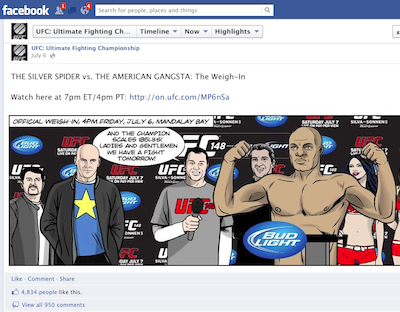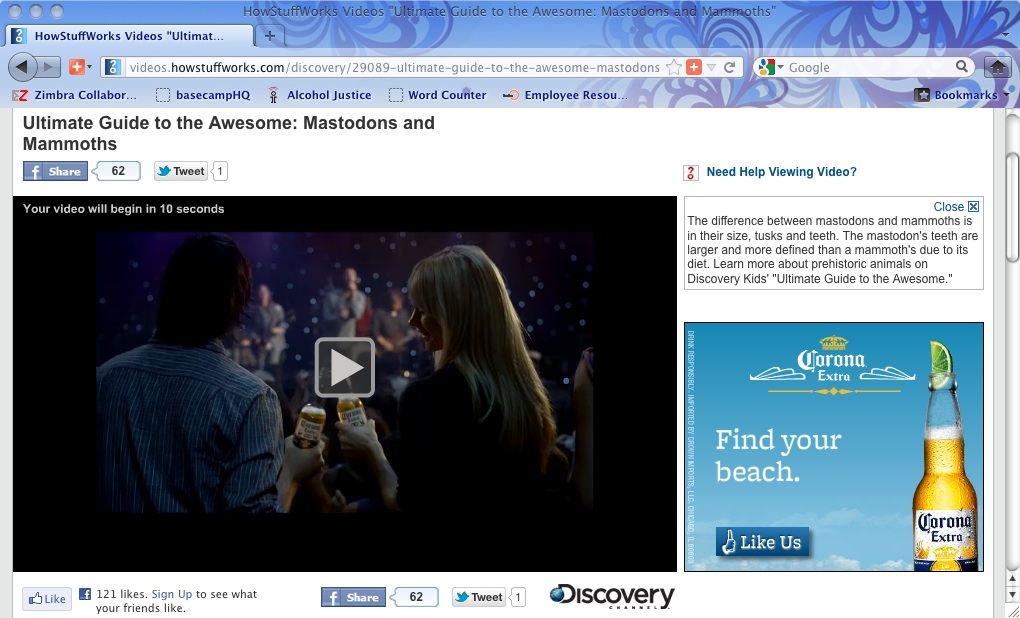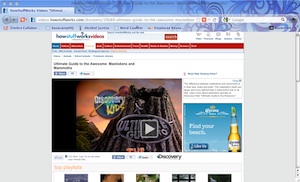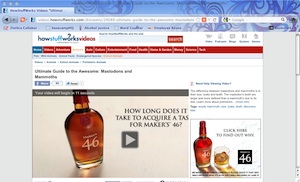In the Doghouse
Search
In the Doghouse
Bud Light and UFC Push Beer to Kids with Comics
- Details
- Published: Tuesday, July 17 2012 15:49
 July 17, 2012
July 17, 2012Anheuser-Busch InBev must enjoy pointedly flaunting all semblance of advertising “self-regulation” – the toothless, voluntary guidelines that alcohol producers and their trade groups insist that they follow. In fact, the ads promoting A-B InBev sponsorship of the Ultimate Fighting Championship (UFC) are a slap in the face to A-B InBev's constant claims about its efforts to “ensure that our communication and marketing activities do not contribute to the misuse of our products, and are not, for instance, directed at people under the legal drinking age.”
So how does a company that says it's committed to not advertising to kids choose to spend millions of its marketing dollars? Get this: comic strips, posted on Facebook, targeting fans of mixed-martial arts fighting, also known as Ultimate Fighting Championships. As the primary sponsor of the brutal and offensive UFC, A-B InBev gets the Bud Light logo delivered directly to the computer screens of millions of kids worldwide. Moreover, they use the quintessential child-friendly format of comic strips to do it. The only way they could top this direct advertising to youth is if they plastered Sponge Bob SquarePants’ picture on Bud Light cans.
In keeping with the voluntary self-regulation facade, the comic strips promoted on the UFC’s Facebook page to its more than 9 million fans are plastered with the Bud Light logo. In addition to the 45% of Facebook users age 25 or younger, UFC President Dana White has made it clear he wants kids watching the UFC. He and his brand target children with UFC trading cards and action figures sold in stores like Toys R Us, as well as suggestive television commercials that promote youth viewership. Between the UFC audience, the youth of Facebook users, and the use of comic strip media, A-B InBev has found the "ultimate" trifecta of factors to ensure that the Bud Light brand and messages reach as many potential young males and minority youth as possible.
Thankfully, some powerful groups have taken notice of A-B InBev sponsorship of UFC and called out both of the corporations for targeting children with inappropriate and harmful ads. The Culinary Workers Union recently sent a forceful letter to A-B InBev expressing disgust at the company’s “socially irresponsible behavior,” demanding that the company “take immediate action and sever its sponsorship of the UFC.” So far, there has been no response from the world’s largest beer maker. So much for self-regulation.
Corona, Beam Global, and Discovery, Inc Target Kids With Alcohol Ads
- Details
- Published: Tuesday, May 01 2012 11:51
by Holley Shafer
Recently m
 y 9-year-old daughter, a budding archaeologist, and I were reading a Discovery News article online about a woolly mammoth found preserved in ice. She clicked on a link from the article to a Discovery Kids "Ultimate Guide to the Awesome" video about mammoths. But before she could watch the video, she had to sit through a 30-second commercial featuring young people being magically transported, via the Corona in their hands, from sitting on a tree branch to dancing at a rock concert on a tropical beach. The video player would not allow us to skip the ad.
y 9-year-old daughter, a budding archaeologist, and I were reading a Discovery News article online about a woolly mammoth found preserved in ice. She clicked on a link from the article to a Discovery Kids "Ultimate Guide to the Awesome" video about mammoths. But before she could watch the video, she had to sit through a 30-second commercial featuring young people being magically transported, via the Corona in their hands, from sitting on a tree branch to dancing at a rock concert on a tropical beach. The video player would not allow us to skip the ad.
When the commercial finished, a static Corona ad appeared right next to the window playing the Discovery Kids video, and stayed there as long as we were on the page. With its big, bright, iconic graphic, there was no way to ignore the ad. Later, the same link to the Discovery Kids video offered a Maker's Mark (Bean Global) bourbon commercial and static ad, just the same way the previous Corona ad did. Other advertisers, like Home Depot and Google, were on rotation as well; upon several refreshes of the link, however, Corona came back again and again.
How, one might ask, is this possible? Isn't advertising harmful products to children illegal? Who are Corona and Beam Global targeting with these ads? What recourse do parents have when their child has been inappropriately exposed to ads like these?
The frustrating answer, as I learned when I began working at Alcohol Justice, is that very little is in place to protect children from alcohol advertising in the U.S. Much more needs to be done.
 Since 2003, the U.S. Federal Trade Commission (FTC) has depended on alcohol industry trade groups (the Wine Institute, the Beer Institute, and the Distilled Spirits Council of the United States/DISCUS) to create and follow their own advertising codes. The codes currently prohibit advertising where audience exposure to youth ages 12 to 20 is likely higher than 28.4% (never mind that the 12-20 age group comprises only 12.6% of the population), despite suggestions by the Surgeon General, National Research Council, Institute of Medicine, state attorneys general, and public health advocates that a 15% threshold would be much more effective in preventing underage drinking.
Since 2003, the U.S. Federal Trade Commission (FTC) has depended on alcohol industry trade groups (the Wine Institute, the Beer Institute, and the Distilled Spirits Council of the United States/DISCUS) to create and follow their own advertising codes. The codes currently prohibit advertising where audience exposure to youth ages 12 to 20 is likely higher than 28.4% (never mind that the 12-20 age group comprises only 12.6% of the population), despite suggestions by the Surgeon General, National Research Council, Institute of Medicine, state attorneys general, and public health advocates that a 15% threshold would be much more effective in preventing underage drinking.
So, what happens when the industry violates its own codes? Instructions for filing a complaint about an ad are practically inaccessible. The impetus is on the public to find out what the industry codes are and file violation complaints. As a result, few complaints are actually filed.
Furthermore, the complaint review process is a farce. Complaints are heard by review boards that include (if not dominated by) industry representatives. In the rare case they find themselves in violation of their own lax codes, they face no penalties—at worst, the beverage producer may be asked to remove the prohibited ad. Of course, this is a win-win for alcohol companies, who get to look like they care about preventing underage drinking and related harm while actively increasing children's exposure to alcohol advertising.
 Meanwhile, alcohol marketing to youth through social media such as Facebook and Twitter has exploded. In 2010, the FTC said it would release a fourth report on industry self-regulation (previous reports were released in 1999, 2003, and 2008). In response to pressure from health and media advocates, the FTC agreed to include to include a focus on the alcohol industry's social media marketing practices. After two comment periods in 2011, the FTC requested alcohol beverage producers to provide the necessary data by June 2012. DISCUS took advantage of the extensive time frame to preempt the investigation and release its own digital marketing guidelines that still ignore the recommended 15% threshold, while issuing press releases saying DISCUS has already addressed the problem.
Meanwhile, alcohol marketing to youth through social media such as Facebook and Twitter has exploded. In 2010, the FTC said it would release a fourth report on industry self-regulation (previous reports were released in 1999, 2003, and 2008). In response to pressure from health and media advocates, the FTC agreed to include to include a focus on the alcohol industry's social media marketing practices. After two comment periods in 2011, the FTC requested alcohol beverage producers to provide the necessary data by June 2012. DISCUS took advantage of the extensive time frame to preempt the investigation and release its own digital marketing guidelines that still ignore the recommended 15% threshold, while issuing press releases saying DISCUS has already addressed the problem.
As we said in our comments on this issue last year, the FTC must stop rubber-stamping the alcohol industry’s failed efforts to self-regulate. Instead, the FTC should implement policies that actually reduce underage exposure to alcohol advertising. Since recent FTC reports have not resulted in improved industry practices, this upcoming report should outline a serious investigation of industry practices, particularly for digital and social media, and present regulatory measures to effectively hold alcohol corporations accountable for their advertising tactics.
As long as the FTC pretends that the alcohol industry can effectively regulate itself, children and youth will continue to be covered with ads. And no amount of "Parents, talk to your kids about alcohol" will get in front of the harm from that exposure.
How, one might ask, is this possible? Isn't advertising harmful products to children illegal? Who are Corona and Beam Global targeting with these ads? What recourse do parents have when their child has been inappropriately exposed to ads like these?
The frustrating answer, as I learned when I began working at Alcohol Justice, is that very little is in place to protect children from alcohol advertising in the U.S. Much more needs to be done.
 Since 2003, the U.S. Federal Trade Commission (FTC) has depended on alcohol industry trade groups (the Wine Institute, the Beer Institute, and the Distilled Spirits Council of the United States/DISCUS) to create and follow their own advertising codes. The codes currently prohibit advertising where audience exposure to youth ages 12 to 20 is likely higher than 28.4% (never mind that the 12-20 age group comprises only 12.6% of the population), despite suggestions by the Surgeon General, National Research Council, Institute of Medicine, state attorneys general, and public health advocates that a 15% threshold would be much more effective in preventing underage drinking.
Since 2003, the U.S. Federal Trade Commission (FTC) has depended on alcohol industry trade groups (the Wine Institute, the Beer Institute, and the Distilled Spirits Council of the United States/DISCUS) to create and follow their own advertising codes. The codes currently prohibit advertising where audience exposure to youth ages 12 to 20 is likely higher than 28.4% (never mind that the 12-20 age group comprises only 12.6% of the population), despite suggestions by the Surgeon General, National Research Council, Institute of Medicine, state attorneys general, and public health advocates that a 15% threshold would be much more effective in preventing underage drinking.So, what happens when the industry violates its own codes? Instructions for filing a complaint about an ad are practically inaccessible. The impetus is on the public to find out what the industry codes are and file violation complaints. As a result, few complaints are actually filed.
Furthermore, the complaint review process is a farce. Complaints are heard by review boards that include (if not dominated by) industry representatives. In the rare case they find themselves in violation of their own lax codes, they face no penalties—at worst, the beverage producer may be asked to remove the prohibited ad. Of course, this is a win-win for alcohol companies, who get to look like they care about preventing underage drinking and related harm while actively increasing children's exposure to alcohol advertising.
 Meanwhile, alcohol marketing to youth through social media such as Facebook and Twitter has exploded. In 2010, the FTC said it would release a fourth report on industry self-regulation (previous reports were released in 1999, 2003, and 2008). In response to pressure from health and media advocates, the FTC agreed to include to include a focus on the alcohol industry's social media marketing practices. After two comment periods in 2011, the FTC requested alcohol beverage producers to provide the necessary data by June 2012. DISCUS took advantage of the extensive time frame to preempt the investigation and release its own digital marketing guidelines that still ignore the recommended 15% threshold, while issuing press releases saying DISCUS has already addressed the problem.
Meanwhile, alcohol marketing to youth through social media such as Facebook and Twitter has exploded. In 2010, the FTC said it would release a fourth report on industry self-regulation (previous reports were released in 1999, 2003, and 2008). In response to pressure from health and media advocates, the FTC agreed to include to include a focus on the alcohol industry's social media marketing practices. After two comment periods in 2011, the FTC requested alcohol beverage producers to provide the necessary data by June 2012. DISCUS took advantage of the extensive time frame to preempt the investigation and release its own digital marketing guidelines that still ignore the recommended 15% threshold, while issuing press releases saying DISCUS has already addressed the problem.As we said in our comments on this issue last year, the FTC must stop rubber-stamping the alcohol industry’s failed efforts to self-regulate. Instead, the FTC should implement policies that actually reduce underage exposure to alcohol advertising. Since recent FTC reports have not resulted in improved industry practices, this upcoming report should outline a serious investigation of industry practices, particularly for digital and social media, and present regulatory measures to effectively hold alcohol corporations accountable for their advertising tactics.
As long as the FTC pretends that the alcohol industry can effectively regulate itself, children and youth will continue to be covered with ads. And no amount of "Parents, talk to your kids about alcohol" will get in front of the harm from that exposure.
Rhode Island Bill to Eliminate Alcohol Sales Tax on Holidays
- Details
- Published: Tuesday, April 03 2012 13:51
 In these tough budget times, Rhode Island legislators have introduced a bill that will decrease state revenue and contribute to alcohol-related harm. RI House Bill 7725 would remove the state sales tax on alcohol for days surrounding select holidays including Memorial Day, Fourth of July, Labor Day, Thanksgiving, and Winter Holidays. In all, the bill would provide for 66 days of alcohol-tax-free sales each year – and make it easy for drinkers in Rhode Island to buy an entire year's supply of alcohol without paying a dime in sales tax on it.
In these tough budget times, Rhode Island legislators have introduced a bill that will decrease state revenue and contribute to alcohol-related harm. RI House Bill 7725 would remove the state sales tax on alcohol for days surrounding select holidays including Memorial Day, Fourth of July, Labor Day, Thanksgiving, and Winter Holidays. In all, the bill would provide for 66 days of alcohol-tax-free sales each year – and make it easy for drinkers in Rhode Island to buy an entire year's supply of alcohol without paying a dime in sales tax on it.Why would Rhode Island, a state facing massive budget shortfalls and the possibility of extreme budget cuts, want to reduce taxes on one of the few items that most Americans agree should be taxed more heavily? In addition to extreme pressure from alcohol industry lobbyists, the answer is likely related to “competition” with neighboring states like Massachusetts, which eliminated the sales tax on alcohol in 2010, and Connecticut, which is also trying to dismantle alcohol regulations. These so-called "competitive advantages" come with large costs to the public's health and wallet, as alcohol-related harm is inversely correlated with price.
Before Rhode Island legislators move House Bill 7725 any further, they should consider the health and fiscal impact that removing the alcohol sales tax for nearly a fifth of the year will have on their state. Increasing the price of alcohol has the win-win effect of both increasing state funding and decreasing alcohol-related harm, and this bill does exactly the opposite. What's next? Eliminating the sales tax on alcohol for weeks surrounding the Super Bowl?
More Articles ...
Help us hold Big Alcohol accountable for the harm its products cause.
| GET ACTION ALERTS AND eNEWS |
STAY CONNECTED    |
CONTACT US 24 Belvedere St. San Rafael, CA 94901 415-456-5692 |
SUPPORT US Terms of Service & Privacy Policy |
Copyright © 2024 Alcohol Justice. All Rights Reserved.
Joomla! is Free Software released under the GNU General Public License.


